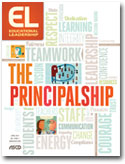I don't agree with you, but go ahead," I said to a teacher after a long discussion about whether she should contact a certain child's mother. The student was having difficulties, and I felt that we needed to bring everyone together and get on top of the situation right away. The teacher, though, wanted to wait and see what happened over the next couple of weeks before sharing her concern with his mom. She thought that things could be turned around with just a bit more time.
I knew the student and had dealt with this parent in the past, and it was obvious to me that communicating sooner was better than waiting. I also suspected that the teacher wanted to delay to avoid a confrontation; that's understandable. But to me, it was a no-brainer: Act now! Yet, here I was, giving the teacher authority to ignore my take on the problem. "What's going on?" you may ask. Indeed, I ask that, too.
How much autonomy I should give teachers is an issue I think about a lot. On what issues should I simply follow my own thinking and make the decision? When do I allow others to make a decision even if I disagree with them? Who decides what?
The question is difficult because teachers expect me to take a position. It's my job! And even if a topic falls outside my area of expertise—which is often the case—I have an opinion. Roland Barth's "myth of presumed competence" illustrates that principals often need to present an aura of confidence and act as though they know just about everything, even though everyone realizes this is far from true.
Of course, even though I am in charge, I don't have a monopoly on knowledge. I wouldn't begin to try to teach 1st graders how to read, I'm still working to understand Singapore math, and our beginning Spanish class is beyond me. Particularly on curriculum issues, teachers often know more than I do; this is a good thing. I delegate and learn.
But I have knowledge and skills on some issues that many teachers do not. Further, there are times when teachers and I see issues differently because of our roles. Teachers naturally focus on their students, whereas I naturally consider schoolwide and community issues. When I was teaching, for example, I resented the time and energy required to prepare for our school's holiday show. The students and parents loved it, but it detracted from instruction. However, when I became a principal, I quickly appreciated how important this evening was to our community.
Delegating when I have unique information or am coming from a schoolwide perspective is difficult. I respect my teachers, want to empower them, and am willing to defer on some issues even when I disagree. But when is it appropriate for me to make the call?
Several rules of thumb help me. First, the more decisions teachers can make, the better it is for everyone. Teachers are professionals who know their curriculum and understand their students, and they need the autonomy to pursue the course that makes sense to them. Truly having power means giving it away, and over time I have found myself making fewer decisions for others. I won't always agree with their decisions, but their feelings of ownership stem from knowing that they have the right to decide.
Second, teachers earn autonomy. Not only does an experienced teacher have the right to more leeway than does a rookie, growth happens when we learn from mistakes. I particularly encourage talented and seasoned teachers to take risks and try new things.
Third, I need to be clear in my mind about the amount of autonomy I'm willing to give. On some issues, such as a safety concern, there is no leeway; I make the decision. On other issues, I may have a preference, but I'm fine with a range of strategies. We've adopted the Step Up to Writing program, for example, but whether teachers use writers' workshops, a more teacher-directed approach, or a combination as they implement the program is up to them. However, teaching writing by having students copy famous authors' works is not an option.
In the situation cited earlier, although I thought the teacher should initiate contact with the student's mother, her strategy was within my acceptable realm. Also, she is a teacher whose judgment I respect. The teacher waited a couple of weeks, and the eventual meeting with the student's mom was fine. I'm glad I didn't force the issue.
Fourth, confusion reigns in the absence of information, so I need to share my thinking with the faculty. Doing this affirms the school's decision-making structure and avoids miscommunication and altercations. A lack of explanation leads teachers to think I'm inconsistent or disrespectful. We get into trouble if we assume everyone sees things the same way we do.
I often refer to my "your decision, my decision, our decision" model to illustrate that autonomy varies by issue. This helps teachers understand that some issues are theirs to decide, some are mine, and some are shared. I've used this phrase enough that my faculty members now refer to it when we are solving problems. Teachers need to know who's deciding what in order to understand what autonomy they have. Who's deciding what at your school, and how is that being shared?
